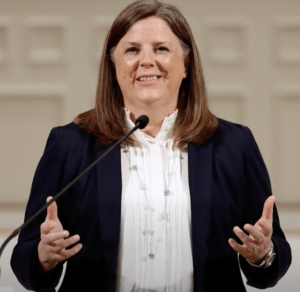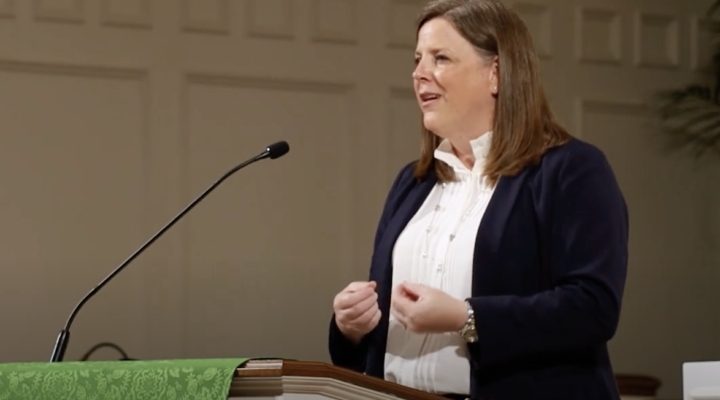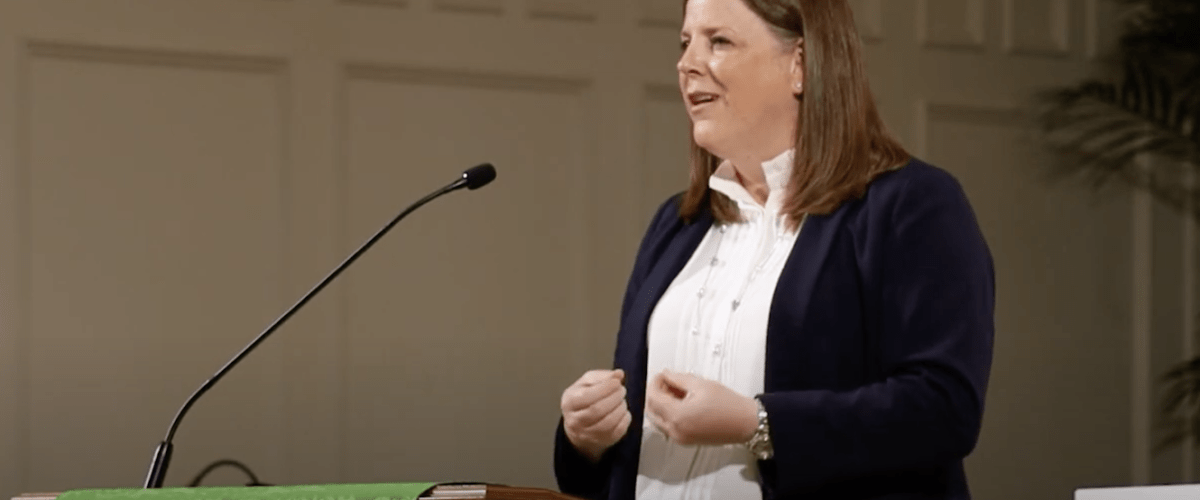New manifestations of the church emerging from the COVID-19 pandemic will include more openness and opportunities for women called to ministry, but it may take decades for that acceptance to become widespread in Baptist and other Christian spaces, Meredith Stone said during Baptist Women in Ministry’s June 30 virtual annual gathering.
Time is needed “to untangle the embedded patriarchal strongholds within the church,” said Stone, executive director of BWIM. “Struggles for women in ministry are still a reality even in our moderate and progressive Baptist churches. And the struggles are exponentially more difficult for women who are part of marginalized communities who face layers of oppression that they have to fight just to be who they really are.”
Stone’s sermon punctuated the first BWIM annual gathering since 2019, with last year’s event canceled due to the pandemic. The 2021 meeting included musical worship, a performance by spoken word artist Sharlene Provilus, testimonies from mentoring program participants and award presentations.
“Struggles for women in ministry are still a reality even in our moderate and progressive Baptist churches.”
Stone opened the gathering with remarks reminding viewers that women are among those who suffered especially deeply during the coronavirus outbreak.
“All of the research and statistics and personal anecdotes which we have heard point to the fact that women have disproportionally borne the weight of the pandemic,” she said. “And in Baptist life, where women already are disadvantaged in being able to live out their callings, we’re working diligently to make sure that the long-term effects of the pandemic don’t send us in a backward direction.”
BWIM, she added, is working to help encourage the post-pandemic reconfiguration of ministries and congregations into “a more equitable expression of the church for women.”

Sharlene Provilus
Provilus used her rhyming, rhythmic performance to praise the courage of called women for enduring the belittling attitudes and labels used against them and urged them to forge ahead despite the obstacles.
“Be bold, beautiful, biblically literate, articulate, radical, real and ridiculously revered. Thank God you are not a summation of unjust things said and done to you. Keep fighting the good fight,” Provilus said.
“We anticipate the day when your gifts and calling are properly recognized on this side of heaven, a day when the body affirms all of its members. Until then, count all progress a win,” she continued. “We are coworking with God to draft a new narrative to this story, advocating for the equitable treatment of all those called to equip saints for the work of ministry.”
Stone acknowledged that optimism in her sermon, which expounded on the theme of the gathering, “New Mercies.”
“We too can hope for tangible, this-worldly, new mercies from God as well,” she preached. “New ways that God might work among us. Ways that maybe we never even imagined before. New configurations of the church and world which are moving us closer to ‘on earth as it is in heaven.’”
Stone said Scripture illuminates a hopeful path from the chaos and suffering endured during the pandemic: “The Book of Lamentations teaches us what it is to lament and grieve in the face of tremendous loss.”
In addition to the disease, that loss includes the virtual witnessing of multiple murders of African Americans and the conflict that erupted when Americans demanded racial justice, she added. And political rancor between Americans, including a divisive presidential election and the Jan. 6 insurrection at the U.S. Capitol, have been another source of suffering, “not to mention the effects all of it had on our mental health and our family dynamics.”

Meredith Stone
The deaths of loved ones and the loss of jobs and church fellowships were the painful backdrop to social and political instability, Stone added. “Is it any wonder that we might ask, ‘Does God really have new mercies for us?’”
But even those wounds can be healed through participation in communal and individual grieving. “We too can claim the power of lamenting, of voicing our pain so that hope might be born out of suffering,” she said.
Those who have suffered under the policies and structures of systemic racism also can find solace from lament, she declared. “And maybe God even has new mercies for those of us who witness it, participate in it, and benefit from it. We repent.”
God’s mercy is good news for women, Stone said. “God also has new mercies for women who are still being told to sit down and go home; for women who are called by God but yet face dismal prospects of being able to live out that call; for women who are called ‘sweetheart’ or ‘Jezebel’ or told they should wear Super Glue for lipstick; for women who face sexual, physical, emotional or spiritual abuse at the hands of a theology that tells them they are less than human.
“We lament the repression of women and as a community we … join together so that we might see the reality of a church, a beloved community of God’s people where every person is valued and affirmed and created in the divine image. God has new mercies for us.”
Among the annual awards presented once again at this year’s gathering, Dorisanne Cooper, pastor of Watts Street Baptist Church in Durham, N.C., was named 2021 Frankie Huff Granger Distinguished Mentor; and Pintlala Baptist Church in Hope Hull, Ala., was named 2021 Church of Excellence.
This year’s Addie Davis Award winners are Nataly Mora, a recent graduate of Truett Seminary, who was recognized for outstanding leadership in pastoral ministry; and Brittany Darst-Hermsen Edwards, a May graduate of Duke Divinity School, who was recognized for excellence in preaching.
Related articles:


